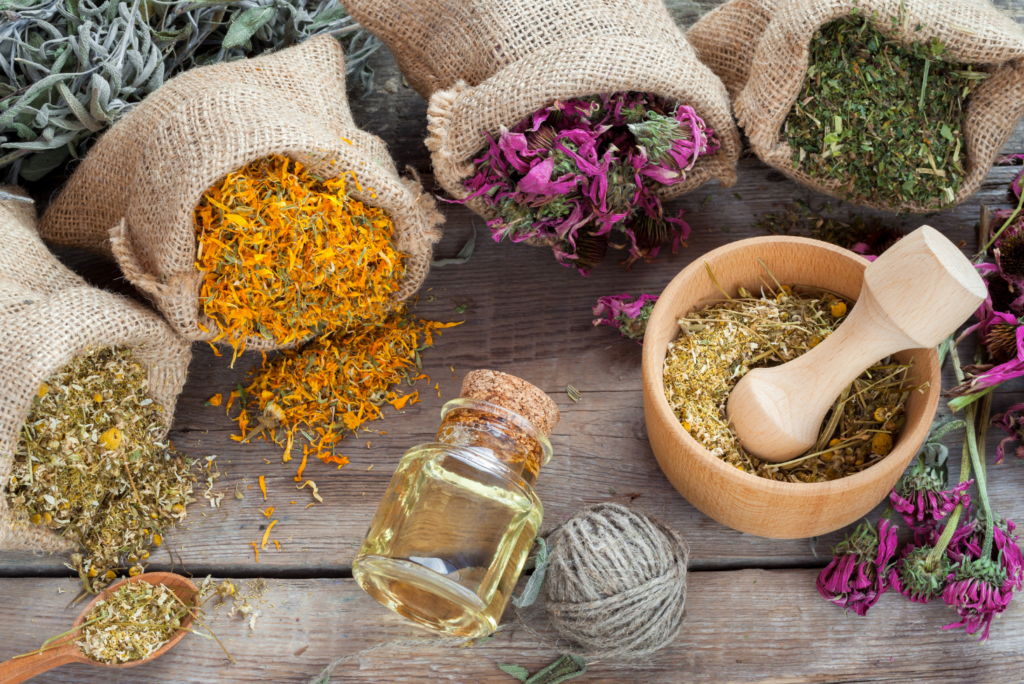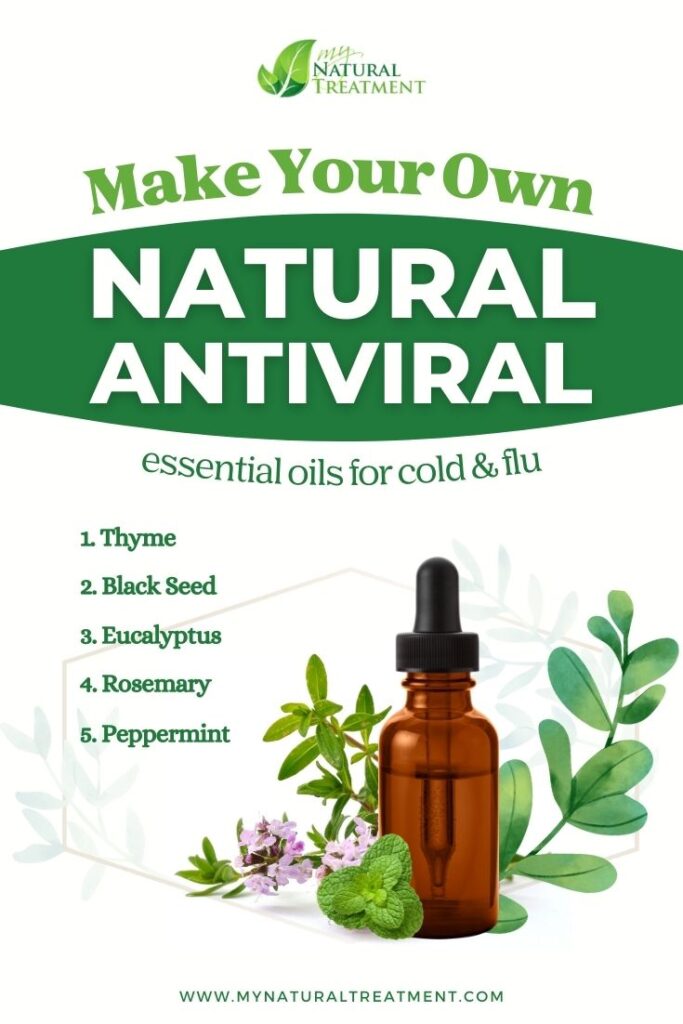Want to learn how to make natural antiviral for cold and flu? Continue reading this article and discover the top natural antiviral medicine that can fight cold and flu.
Natural antivirals can help with mild cases of cold and flu, but they work best as prevention when used at the very first symptoms. When used at the very first symptoms of a viral infection, they can reduce the time of sickness and the overall symptoms. If you want to learn how to make a natural antiviral at home, here are the top essential oils with powerful antiviral properties.
In This Article You Will Find:
Natural Antiviral Recipe with Essential Oils
Essential oils extracted by steam distillation have the most concentrated form of active properties. They contain naturally occurring compounds called terpenes, which have a wide range of medicinal uses among which antiplasmodial activity is notable as its mechanism of action is similar to the popular antimalarial drug in use – chloroquine.
The most potent essential oils that you can use to make your own natural antiviral for cold and flu have a large number of monoterpenes, a class of terpenes widely studied for their antiviral property. They also have powerful antimicrobial, antiviral, and anti-inflammatory properties, and you can use them independently or, even better, together in a powerful natural antiviral blend.
These antiviral essential oils are:
- Thyme oil
- Black seed oil
- Eucalyptus oil
- Rosemary oil
- Peppermint oil
Before we move on to the simple natural antiviral recipe, here is a little info on each of these essential oils and why they make the best combo for mild symptoms of cold and flu as well as prevention.
Top 5 Natural Antiviral Essential Oils
1. Thyme Oil
(Thymus vulgaris)
Active ingredients: thymol, carvacrol, terpinene, cymene, linalool, myrcene, isoborneol
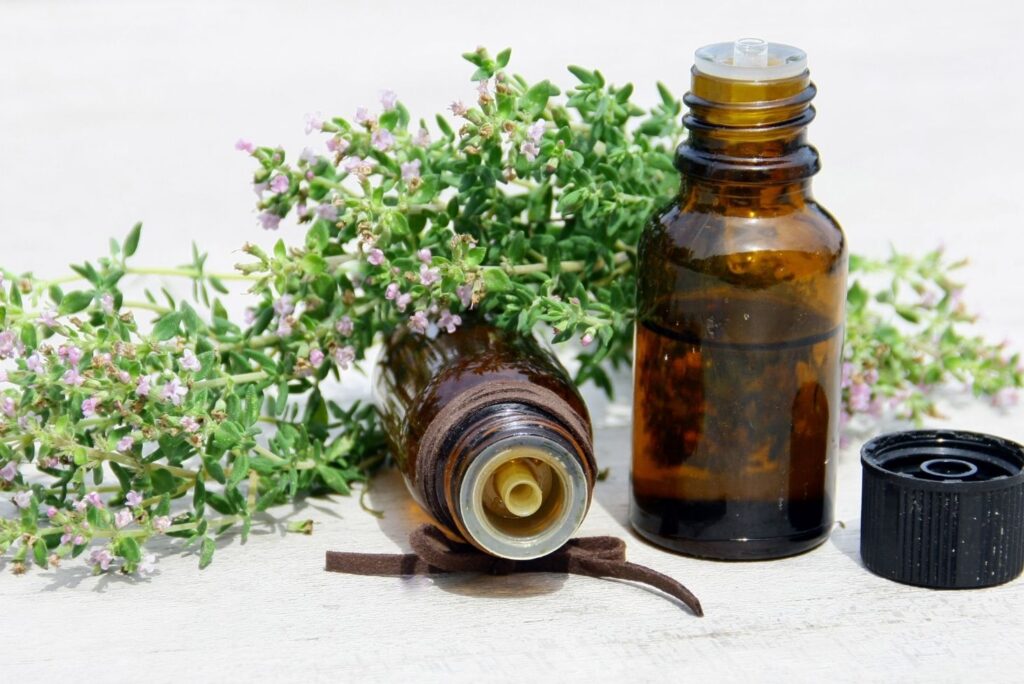
Thyme is one of the most powerful natural antiviral and antimicrobial herbs there is. Its volatile oils are rich in thymol, and carvacrol, two monoterpenoids that cause structural and functional damage to the cell membrane of bacteria and fungi. More importantly, carvacrol is a potential alternative treatment for the excessive immune response induced by influenza virus A infection.
Both thymol and carvacrol are also effective antibacterial agents. Thymol interacts with the embedded proteins at the surface of bacteria, which leads to changes in the conformation and activity of internal and membrane proteins. Carvacrol does something similar, leading to cell membrane tension and destabilization.
Thyme oil is also rich in terpinene, an active compound with known antimicrobial, antifungal, antioxidant, and anti-inflammatory properties for the respiratory and digestive tracts. Another active compound found in thyme oil is myrcene, known for its antioxidant properties and the fact that it helps reduce inflammation in the body. To top everything off, this amazing oil contains another powerful active compound called isoborneol, which is also a notable antiviral agent with important neuroprotective and anticoagulant properties. All these properties make thyme oil one of the best natural antivirals for our natural antiviral blend.
2. Black Seed Oil
(Nigella sativa)
Active ingredients: thymoquinone, cymene, terpene, terpinene, alpha-pinene, β-pinene, thymol, carvacrol, longifolene
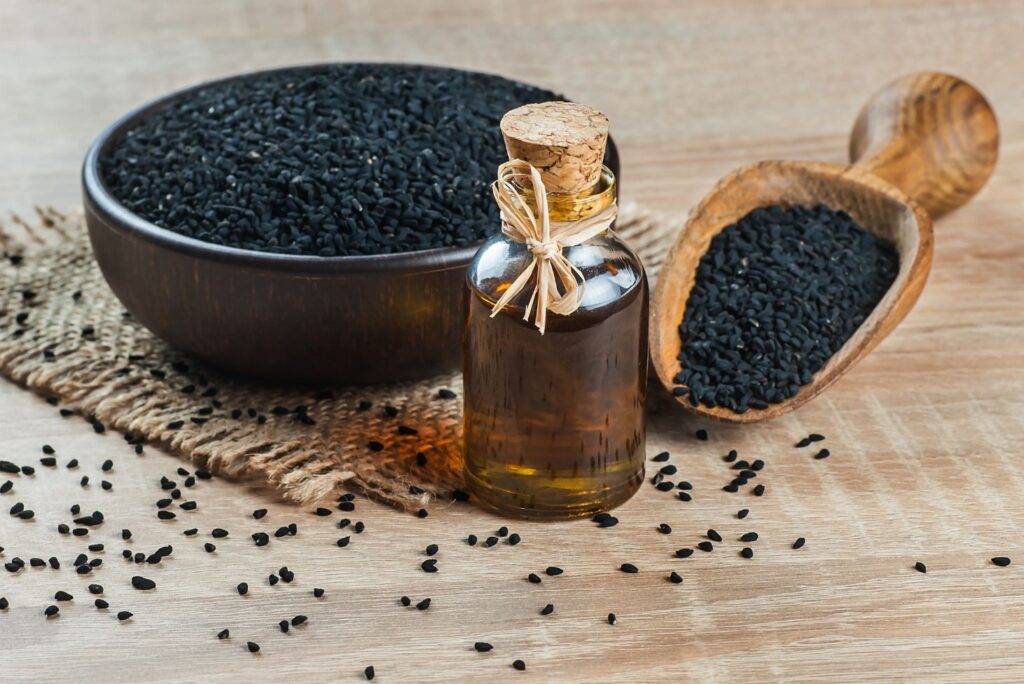
In the Arabic world of medicine, black seeds are a known panacea since very old times. Black seeds have traditionally been used for the treatment of several diseases and ailments including asthma, bronchitis, rheumatism, and related inflammatory diseases. The main active compound in black seeds is thymoquinone, a powerful neuroprotective terpene with proven anti-inflammatory properties, that preserves mitochondrial integrity and thus prevents neurological damage from inflammation caused by viruses.
Moreover, black seeds consist of a complex blend of monoterpene hydrocarbons (alpha and beta-pinenes) that have protective effects against respiratory disorders. Tunisian black seed oil has a large content of cymene, a very powerful anti-inflammatory. Even more, black seed oil has proven pulmonary-protective activity and anti-asthmatic effects.
3. Eucalyptus Oil
(Eucalyptus globulus)
Active ingredients: 1,8-cineole, alpha-pinene, terpineol, phellandrene, isopulegol, camphene
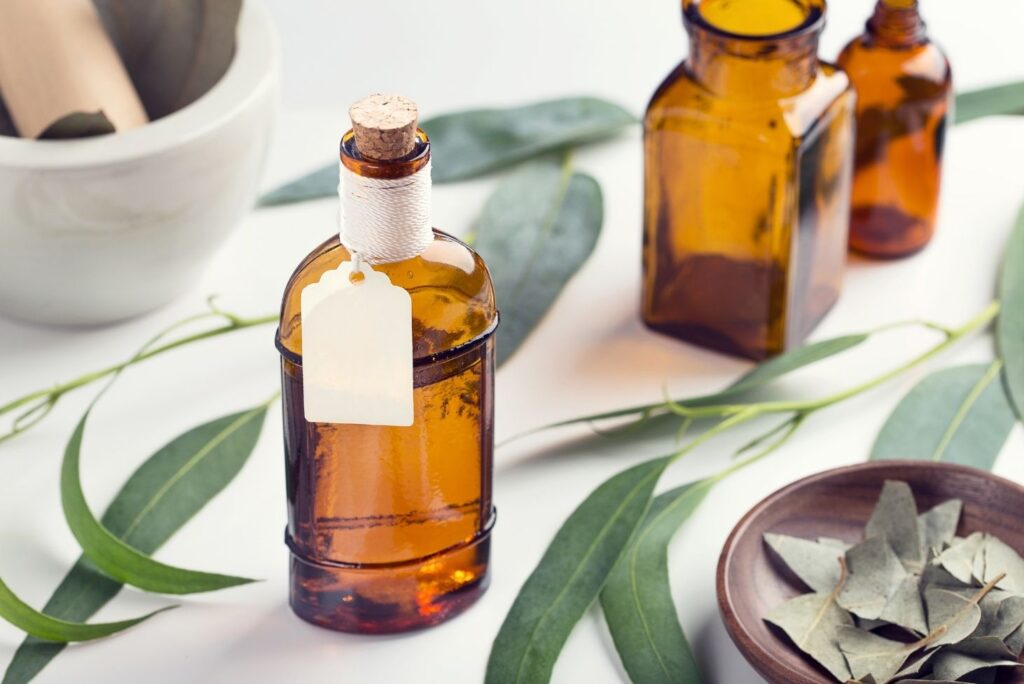
Eucalyptus oil has anti-inflammatory properties with bronchodilatory effects and is one of the top herbal medicines to add to your natural antiviral blend. The value of eucalyptus oil for medicinal purposes lies in its cineole content, a terpene that has proven to actively and significantly reduce upper respiratory distress, according to a 2013 study. A good eucalyptus oil product for internal use should have at least 70% cineole content.
According to a 2009 study, the two monoterpenes with the highest virucidal activity are both abundantly found in eucalyptus oil. We’re talking about terpineol and alpha-pinene. Two other monoterpenes found in eucalyptus oil, phellandrene, and isopulegol are known for their anti-inflammatory, antibacterial, anti-fungal, antiviral, and natural pain killer effects.
More so, 1,8-cineole from eucalyptus oil has mucolytic and spasmolytic action on the respiratory tract, with proven clinical efficacy. The study concluded that cineole can be effectively used as long-term therapy in the prevention of COPD exacerbations and improving asthma control.
4. Rosemary Oil
(Rosmarinus officinalis)
Active ingredients: oleanolic acid, alpha-pinene, β-pinene, camphene, limonene, 1,8-cineole, camphor, linalool, borneol, caryophyllene, carene, carnosol
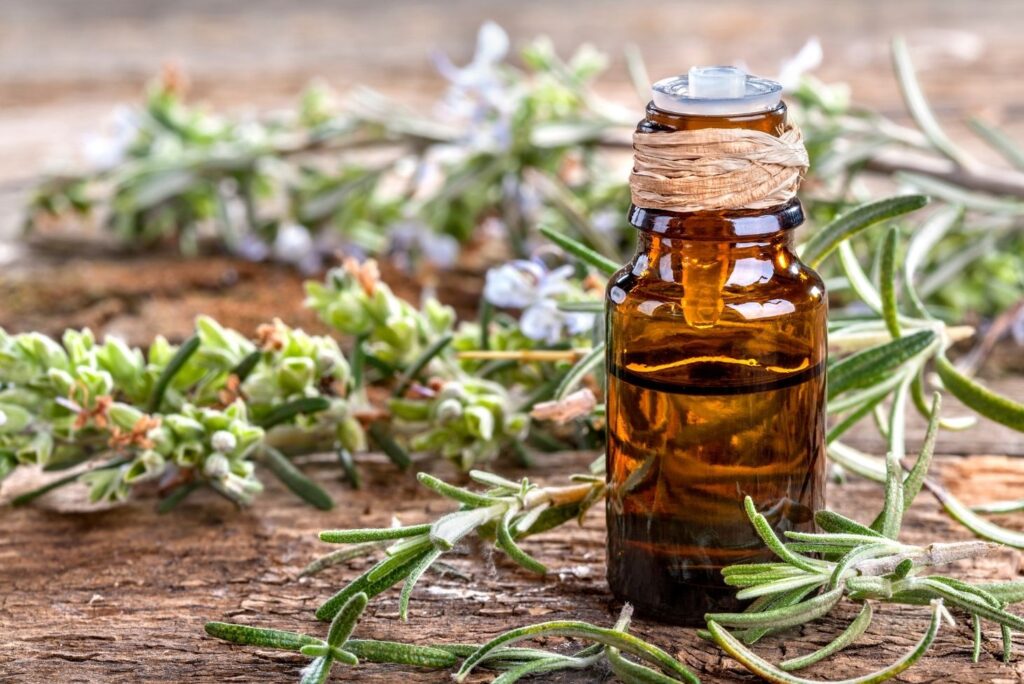
Rosemary oil contains three of the four most powerful virucidal terpenes, namely 1,8-cineole, alpha-pinene, linalool, and caryophyllene. 1,8-cineole and linalool have a strong binding affinity to the human ACE2 cell receptor in silico experiments, while limonene downregulated the ACE2 receptor as well. Oleanolic acid in rosemary extract has proven antiviral action.
A Lebanese showed that 1,8-cineole, alpha-pinene, and beta-pinene were the main terpenes with proven activity against viral infections. Rosemary oil also contains camphene, a terpene that possesses anti-inflammatory, analgesic, antibiotic, and antioxidant properties, especially when mixed with vitamin C. Even more, borneol in essential eucalyptus oil has proven efficacy in bronchial symptoms, and asthma. This makes rosemary oil an amazing natural antiviral.
5. Peppermint Oil
(Mentha piperita)
Active ingredients: phellandrene, menthol, carvone, borneol, pulegone, limonene, ocimene

The last virucidal essential oil on our list, but not least, is peppermint oil. Alongside eucalyptus oil, peppermint essential oil has been shown to reduce morbidity caused by infectious bronchitis virus of immunosuppressed broilers. Phellandrene, one of the terpenes in peppermint oil, has been used in Eastern medicine as a powerful antimicrobial, and when combined with limonene, also present in this essential oil, this terpene has shown decreased sensitivity to nerve pain.
A study published in 2021 showed that pulegone effectively bounds to the S1 RBD of the spike (S) glycoprotein of viruses. To support this information, a 2020 study on essential oils has shown that, amongst other monoterpenes, pulegone extracted from peppermint family plants is an effective antiviral agent that has the potential to inhibit the viral surface protein. Even more, alongside limonene, ocimene has also been reported to demonstrate antiviral activity.
Carvone, another terpene in peppermint oil has anti-inflammatory and anti-allergic effects on allergic inflammation of the airways, while menthol has been reported to provide symptomatic relief from nasal congestion. Menthol also has gastroprotective, anti-inflammatory, and immunomodulatory properties and inhibits the herpes simplex virus and the coxsackieviruses. Needless to say, essential peppermint oil is one of the top natural antivirals.
How To Make Natural Antiviral – Recipe
Here is how you can make your own natural antiviral at home.
Preparation
Mix equal parts of these 5 essential oils for internal use (therapeutic food grade) into a small amber bottle with a dropper. Seal the bottle and give it a good shake. Keep the bottle sealed, in a dark place away from direct sunlight, at room temperature.
How to Use
You can take 3-5 drops three times a day for 7-14 days. Dilute the oils in a tsp of raw honey, sweet syrup, or on a small piece of bread (for diabetics). Pause for 2 weeks and resume if needed. For children between 7-14 years of age, the dosage is 1-2 drops three times a day with honey. These essential oils are not recommended for children under 7 years of age, because of their potency. Always use these essential oils diluted, otherwise, they can burn your throat. Essential oils are not supposed to taste good, so don’t expect a pleasant taste. Be careful, it may sting/irritate the throat even if diluted!
Safety & Precautions
These essential oils are not recommended for pregnant women, nursing mothers, and people who have hypersensitivity to one or more of the essential oils in the blend. Essential oils are very powerful and they can burn, so avoid eye contact! Do not overdose and don’t take for more than 14 days in a row.
Natural Antiviral Foods & Herbs
Nature has provided us with enough natural antiviral foods to stay healthy and protected. In addition, there are many natural extracts with effectiveness against cold and flu symptoms. Some of these compounds are naturally found in the following spices, foods, or essential oils:
- Garlic/garlic oil
- Ginger
- Turmeric
- Onion
- Oil of oregano
- Ajowan
- Lemongrass
- Bay leaf oil
- Hemp oil
- Black pepper
We really hope that the information here has empowered you when it comes to keeping yourself healthy. These natural antivirals for cold and flu have proven their antiviral efficacy against many viruses, and their therapeutic benefits are even greater. They are most effective when used at the first symptoms. Before using essential oils internally, please consult a naturopath. Stay healthy, naturally!
Share on Pinterest ❤️


